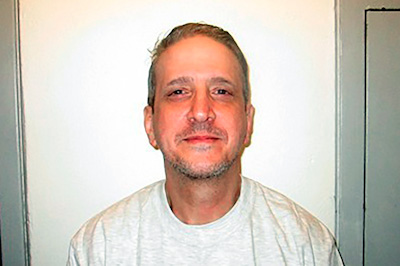SCOTUS will hear death row inmate's wrongful-conviction claim supported by state attorney general

Oklahoma death row inmate Richard Glossip on Feb. 19, 2021. The U.S. Supreme Court on Monday agreed to decide whether Glossip is entitled to reversal of his conviction. (Photo by the Oklahoma Department of Corrections via the Associated Press)
The U.S. Supreme Court on Monday agreed to decide whether Oklahoma death row inmate Richard Glossip is entitled to reversal of his conviction because the state suppressed evidence that a co-defendant who implicated Glossip had been diagnosed with bipolar disorder.
Glossip’s cert petition maintains that the suppression of the psychiatric evidence violated Glossip’s right to due process, and his conviction should be reversed because his trial was so infected with errors that the state’s Republican attorney general supports vacating the conviction.
Law360 and SCOTUSblog are among the publications with coverage.
The Supreme Court had stayed Glossip’s execution last May pending disposition of the cert petition.
Glossip was convicted in 2004 for the January 1997 murder of Barry Van Treese, the owner of an Oklahoma City motel where Glossip worked as a manager. The motel handyman, co-defendant Justin Sneed, had claimed that Glossip promised to pay him $10,000 to carry out the killing. Sneed, a drug user with a history of violence and a criminal record, pleaded guilty to beating Van Treese to death with a baseball bat.
In his trial testimony, Sneed said he was given lithium after he asked for cold medicine, and he didn’t know why because he had never seen a psychiatrist. In reality, Sneed was apparently treated for bipolar disorder in 1997, and the lithium was prescribed for mental illness, according to the cert petition. Prosecutors did not try to correct the testimony.
The Supreme Court granted cert and added a new issue for briefing: whether a decision against Glossip by the state’s top court was an adequate and independent state law ground for the judgment, which would mean that the decision can’t be reviewed by the Supreme Court. The decision by the Oklahoma Court of Criminal Appeals had held that state law barred post-conviction relief.
Glossip’s case was previously before the Supreme Court in a challenge to the use of the sedative midazolam in executions. The high court ruled in June 2015 that petitioners had not established that use of the drug violates the Eighth Amendment ban on cruel and unusual punishment.
Glossip is represented by lawyers John Mills and Donald Knight of Phillips Black in the new cert petition.
Glossip “is innocent of the murder for which he faces execution,” Mills said in a statement emailed to the ABA Journal. “He has no criminal history, no history of misconduct during his entire time in prison, and has maintained his innocence throughout a quarter century wrongfully on death row. It is time—past time—for his nightmare to be over. The court should reverse the Oklahoma Court of Criminal Appeals, which has inexplicably refused to accept the state’s confession of error.”
Knight said in an emailed statement the Oklahoma attorney general’s “concession of error is historically unprecedented, as is the outpouring of support from 62 Oklahoma legislators, including at least 45 death-penalty-supporting Republican lawmakers. Two independent investigations cast grave doubts on the reliability of Mr. Glossip’s conviction. We are gratified that the United States Supreme Court has agreed that it is worthy of full consideration.”
Write a letter to the editor, share a story tip or update, or report an error.



